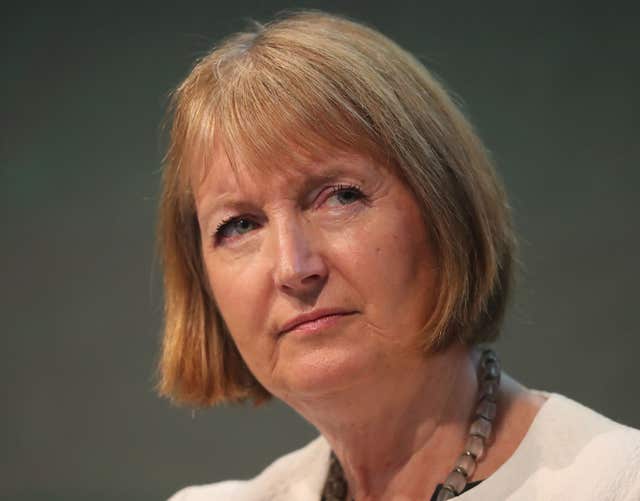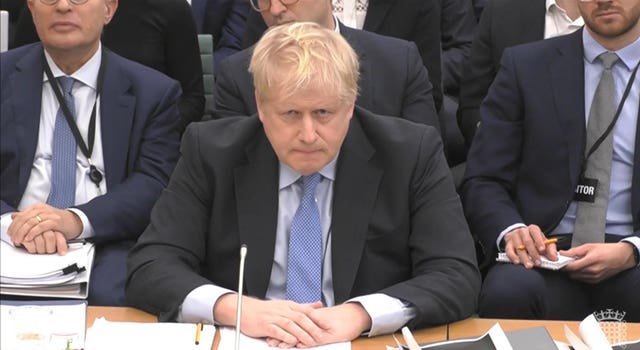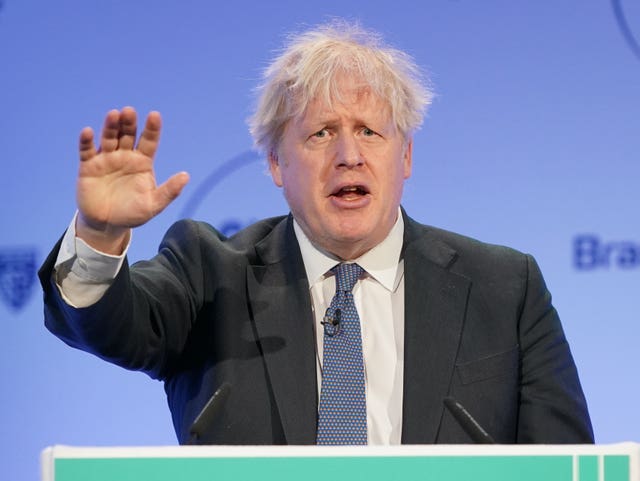Boris Johnson committed “repeated contempts” of Parliament with his partygate denials that merited a 90-day suspension, a cross-party investigation has found.
The Privileges Committee’s recommended suspension for acts, including deliberately misleading MPs, would have paved the way for a by-election for the former prime minister if he had not resigned in anticipation.
Boris Johnson said the Privileges Committee was “beneath contempt” because it had reached a “deranged conclusion” to deliver “what is intended to be the final knife-thrust in a protracted political assassination”.
Former prime minister Boris Johnson would have faced a recommended suspension of 90 days from the Commons for deliberately misleading MPs and “being complicit in the campaign of abuse and attempted intimidation” of the Privileges Committee, had he not quit his seat in protest.
Finding Boris Johnson lied to MPs with his partygate denials, the Privileges Committee wrote: “We conclude that when he told the House and this Committee that the rules and guidance were being complied with, his own knowledge was such that he deliberately misled the House and this committee.”
The Privileges Committee said Boris Johnson committed a “serious contempt of the House” through his partygate denials.
It said in the report: “We came to the view that some of Mr Johnson’s denials and explanations were so disingenuous that they were by their very nature deliberate attempts to mislead the committee and the House, while others demonstrated deliberation because of the frequency with which he closed his mind to the truth.”
It found he also breached confidentiality requirements in his resignation statement by criticising the committee’s provisional findings.
“Mr Johnson’s conduct in making this statement is in itself a very serious contempt,” the report said.
The Privileges Committee suggested Boris Johnson should be barred from having a parliamentary pass, which is normally available to former MPs.
The committee said its provisional findings were that Mr Johnson deliberately misled the House and should be suspended for a period longer than 10 sitting days.
But following his resignation statement and criticism of the committee, the MPs said that “if Mr Johnson were still a Member he should be suspended from the service of the House for 90 days for repeated contempts and for seeking to undermine the parliamentary process”.
The committee said these included: Deliberately misleading the House, deliberately misleading the committee, breaching confidence, “impugning the committee and thereby undermining the democratic process of the House” and “being complicit in the campaign of abuse and attempted intimidation of the committee”.
“We recommend that he should not be entitled to a former Member’s pass,” the MPs said.
The Privileges Committee said Boris Johnson’s attack of its work amounts to “an attack on our democratic institutions”.
Its report said: “We note that Mr Johnson does not merely criticise the fairness of the committee’s procedures; he also attacks in very strong, indeed vitriolic, terms the integrity, honesty and honour of its members.
“He stated that the committee had ‘forced him out (…) anti-democratically’.
“This attack on a committee carrying out its remit from the democratically elected House itself amounts to an attack on our democratic institutions.
“We consider that these statements are completely unacceptable. In our
view this conduct, together with the egregious breach of confidentiality, is a serious further contempt.”
After a 14-month investigation, the Privileges Committee released its findings on whether the former prime minister committed a contempt of Parliament by misleading MPs either recklessly or deliberately by denying lockdown rules were broken in No 10.
Mr Johnson has railed against the committee he has criticised as a “kangaroo court”, and dramatically quit as an MP on Friday after receiving its verdict.

The Tory-majority Privileges Committee is chaired by veteran Labour MP Harriet Harman (Niall Carson/PA)
The former Conservative leader’s resignation means he will not serve the lengthy suspension recommended.
If it was at least 10 days and approved by the Commons, then a by-election in his Uxbridge and South Ruislip constituency could have been triggered.
His decision to quit pre-empted such an outcome, with his constituents to go to the polls next month in a major electoral challenge for Rishi Sunak.
Mr Johnson’s ally Nigel Adams also stepped down and his arch-supporter Nadine Dorries has announced she will go too, though her demands for answers about why she was denied a peerage before she formally quits as an MP look set to prolong the by-election struggle for the Prime Minister.
In a last-ditch attempt to disparage the Tory-majority panel on the eve of publication, he called for its most senior Conservative member to resign.

Boris Johnson faced a three-hour grilling at the Privileges Committee in March (House of Commons/UK Parliament/PA)
He accused Sir Bernard Jenkin of “monstrous hypocrisy” after the Guido Fawkes website reported the MP had gone to a drinks party in Parliament while Covid restrictions were in place in 2020.
But Liberal Democrat deputy leader Daisy Cooper said this was a “typical distraction tactic” from the ex-premier “that doesn’t change the fact he broke the law and lied about it”.
The MPs on the panel have rejected his defence that senior officials advised him Covid rules and guidance had been followed in No 10, according to the Times.
A senior aide in fact warned him against claiming to the Commons that social distancing guidelines were observed, the newspaper reported.
A vote could be held on the seven-person committee’s conclusions in the Commons next week.

Boris Johnson resigned as an MP after accusing a Commons investigation of attempting to ‘drive me out’ (Jonathan Brady/PA)
A majority vote in favour would amount to a significant rebuke for Mr Johnson less than a year after he left No 10.
Home Office minister Chris Philp argued the MPs, including Tory former Cabinet minister Sir Jacob Rees-Mogg who branded it a “kangaroo court”, should not be censured.
“Although I don’t characterise the committee in those terms, I think people are free to express their opinions,” he told ITV’s Peston.
“I don’t think we should be trying to sort of muzzle MPs.”
Senior Tory MP Caroline Nokes told the same programme that “the psychodrama of what’s going on with the former minister, the chaos of these by-elections” were a “distraction” from the big issues facing the country.
Boris Johnson's reaction to the report in full
Here is the full text of Boris Johnson’s statement in response to the Privileges Committee’s report:
Boris Johnson’s response to Privileges Committee report
It is now many months since people started to warn me about the intentions of the Privileges Committee. They told me that it was a kangaroo court. They told me that it was being driven relentlessly by the political agenda of Harriet Harman, and supplied with skewed legal advice – with the sole political objective of finding me guilty and expelling me from parliament.
They also warned me that most members had already expressed prejudicial views – especially Harriet Harman – in a way that would not be tolerated in a normal legal process. Some alarmists even pointed out that the majority of the committee voted remain and they stressed that Bernard Jenkin’s personal antipathy to me was historic and well-known.
To be frank, when I first heard these warnings, I was incredulous. When it was first proposed that there should be such an inquiry by this committee, I thought it was just some time-wasting procedural stunt by the Labour party.
I didn’t think for one minute that a committee of MPs could find against me on the facts, and I didn’t see how any reasonable person could fail to understand what had happened.
I knew exactly what events I had attended in Number 10. I knew what I had seen, with my own eyes, and like the current PM, I believed that these events were lawful. I believed that my participation was lawful, and required by my job; and that is indeed the implication of the exhaustive police inquiry.
The only exception is the June 19 2020 event, the so-called birthday party, when I and the then Chancellor Rishi Sunak were fined in circumstances that I still find puzzling (I had lunch at my desk with people I worked with every day).
So when on Dec 1 2021 I told the House of Commons that “the guidance was followed completely” (in Number 10) I meant it. It wasn’t just what I thought: it’s what we all thought – that we were following the rules and following the guidance completely – notwithstanding the difficulties of maintaining social distancing at all times.
The committee now says that I deliberately misled the House, and at the moment I spoke I was consciously concealing from the House my knowledge of illicit events.
This is rubbish. It is a lie. In order to reach this deranged conclusion, the committee is obliged to say a series of things that are patently absurd, or contradicted by the facts.
First, they say that I must have known that the farewell events I attended were not authorised workplace events because – wait for it – NO SUCH EVENT could lawfully have taken place, anywhere in this country, under the committee’s interpretation of covid rules.
This is transparently wrong. I believed, correctly, that these events were reasonably necessary for work purposes. We were managing a pandemic. We had hundreds of staff engaged in what was sometimes a round-the-clock struggle against Covid. Their morale mattered for that fight. It was important for me to thank them.
But don’t just listen to me. Take it from the Metropolitan Police. The police investigated my role at all of those events. In no case did they find that what I had done was unlawful. Above all it did not cross my mind – as I spoke in the House of Commons – that the events were unlawful.
I believed that we were working, and we were: talking for the main about nothing except work, mainly Covid. Why would I have set out, in the Chamber, to conceal my knowledge of something illicit, if that account could be so readily contradicted by others? Why would we have had an official photographer if we believed we were breaking the law?
We didn’t believe that what we were doing was wrong, and after a year of work the Privileges Committee has found not a shred of evidence that we did.
Their argument can be boiled down to: “Look at this picture – that’s Boris Johnson with a glass in his hand. He must have known that the event was illegal. Therefore he lied.”
That is a load of complete tripe. That picture was me, in my place of work, trying to encourage and thank my officials in a way that I believed was crucial for the Government and for the country as a whole, and in a way which I believed to be wholly within the rules.
For the Committee now to say that all such events – “thank-yous” and birthdays – were intrinsically illegal is ludicrous, contrary to the intentions of those who made the rules (including me), and contrary to the findings of the Met; and above all I did not for one moment think they were illicit – at the time or when I spoke in the Commons.
The committee cannot possibly believe the conclusions of their own report – because it has now emerged that Sir Bernard Jenkin attended at least one “birthday event”, on Dec 8 2020 – the birthday of his wife Anne – when it is alleged that alcohol and food were served and the numbers exceeded six indoors.
Why was it illegal for me to thank staff and legal for Sir Bernard to attend his wife’s birthday party?
The hypocrisy is rank. Like Harriet Harman, he should have recused himself from the inquiry, since he is plainly conflicted.
The rest of the committee’s report is mainly a rehash of their previous non-points. They have nothing new of substance to say. They concede that they have found no evidence that I was warned, before or after an event, that it was illegal. That is surely very telling. If we had genuinely believed these events to be unauthorised – with all the political sensitivities entailed – then there would be some trace in all the thousands of messages sent to me, and to which the committee has had access.
It is preposterous to say, as the committee does, that people were just too scared to mention concerns to their superiors. Really? Was Simon Case too scared to draw his concerns to my attention? Was Sue Gray or Rishi Sunak?
The committee concedes that the guidance permitted social distancing of less than one metre where there was no alternative – though they refuse to take account of all the other mitigations – including regular testing – that we put in place.
They keep wilfully missing the point. The question is not whether perfect social distancing was maintained at all times in Number 10 – clearly that wasn’t possible, as I have said very often. The question is whether I believed, given the limitations of the building, we were doing enough, with mitigations, to follow the guidance – and I did, and so did everyone else.
They grudgingly accept that I was right to tell the Commons that I was repeatedly assured that the rules were followed in respect of the Dec 18 event in the media room, but they try, absurdly and incoherently, to say that the assurances of Jack Doyle and James Slack were not enough to constitute “repeated” assurances – completely and deliberately ignoring the sworn testimony of two MPs, Andrew Griffiths and Sarah Dines, who have also said that they heard me being given such assurances.
Perhaps the craziest assertion of all is the committee’s Mystic Meg claim that I saw the Dec 18 event with my own eyes. They say, without any evidence whatever, that at 21.58pm, on that date, my eyes for one crucial second glanced over to the media room as I went up to the flat – and that I saw what I recognised as an unauthorised event in progress.
First, the committee has totally ignored the general testimony about that evening, which is that people were working throughout, even if some had been drinking at their desks. How on earth do these clairvoyants know exactly what was going on at 21.58?
How do they know what I saw? What retinal impressions have they somehow discovered, that are completely unavailable to me? I saw no goings on at all in the press room, or none that I can remember, certainly nothing illegal.
As the committee has heard, officials were heavily engaged in preparing difficult messaging about the prospect of a No-deal Brexit and a Christmas lockdown.
It is a measure of the committee’s desperation that they are trying incompetently and absurdly to tie me to an illicit event – with an argument so threadbare that it belongs in one of Bernard Jenkin’s nudist colonies.
Their argument is that I saw this event, believed it to be illegal, and had it in my head when I spoke to the House. On all three counts they are talking out of the backs of their necks. If I did see an illegal event, and register it as illegal, then why was I on my own in this? Why not the Cabinet Secretary, or Sue Gray, or the then Chancellor, who was patrolling the same corridors at the time?
The committee is imputing to me and me alone a secret knowledge of illegal events that was somehow not shared by any other official or minister in Number 10. That is utterly incredible. That is the artifice.
This report is a charade. I was wrong to believe in the committee or its good faith. The terrible truth is that it is not I who has twisted the truth to suit my purposes. It is Harriet Harman and her committee.
This is a dreadful day for MPs and for democracy. This decision means that no MP is free from vendetta, or expulsion on trumped up charges by a tiny minority who want to see him or her gone from the Commons.
I do not have the slightest contempt for Parliament, or for the important work that should be done by the Privileges Committee.
But for the Privileges Committee to use its prerogatives in this anti-democratic way, to bring about what is intended to be the final knife-thrust in a protracted political assassination – that is beneath contempt.
It is for the people of this country to decide who sits in Parliament, not Harriet Harman.







